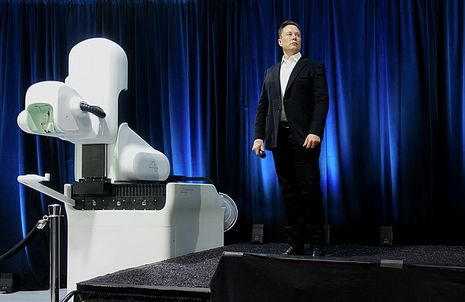When money talks too loudly…the case of ego-billionaires
The rise of the vocal celebrity rich raises serious questions over who we should really be listening to, says Ezra Izer

When it comes to the pantheon of twenty-first century tech magnates, Elon Musk has certainly emerged as a uniquely polarising individual. His alarming metamorphosis over recent years, from economic titan to dictator of the digital sphere, provides us with the perfect specimen for deconstructing what it means to be a billionaire in the modern age. Far more significantly, he underscores the dangers associated with leaving such corporate figures unchecked.
These processes do not end at Musk. He is but one example of the contemporary ethical dance between economic power and subsequent political influence. Given how severely it has altered the tempo of western society, we must awaken ourselves to the reality of this tango. In other words, we must consider why the actors of the global stage are seemingly awarded on a basis of who can write and recite their chosen rhetoric the loudest.
To do this, we must first evaluate how being an audience to this spectacle of the wealthy does – in many ways – implicate us. The twenty-first century ease with which capital elevates businessmen to cultish online followings sensationalises them into idols. This only encourages them to exercise further power over others in future, with the implication being that they are not only worthy of their infinite wealth, but also that said wealth is proportional to the extent of their genius. Hence, it is not very surprising that this gaggle of entrepreneurs find themselves so inflated with self-importance, when we are the ones actively pumping value into their every speech and action. This is most damaging when said opinions vastly outgrow the technological pot that they were planted in, with the personal politics of a company’s figurehead becoming easily confused with the legitimacy of the entire brand. With such a large scale of economic verification at their disposal, these billionaires are subsequently endowed with an equally large belief in their right to broadcast opinions in such a way.
“it is not very surprising that this gaggle of entrepreneurs find themselves so inflated with self-importance”
To relativise this, what we are left with is something parodying the age-old ‘art versus artist’ dilemma, only one more along the lines of ‘tech versus tech mogul’. When political stances are so often endorsed by the commercial achievements of their speaker, it becomes difficult to disentangle the two. It is, after all, quite a messy procedure to behead the billionaire at the company’s top when it is unclear where exactly the neck is.
To give but one relevant example, such arrogance was demonstrated last year in Musk’s takeover of Twitter: his personal acquisition of a social media platform known primarily for its popular expression. This goes beyond the hypothetical murder of blue birds, reflecting the relationship between economic hegemony and how seamlessly it allows political power to be ‘bought’. Even more troubling is his involvement in the military circumstance of Russia’s ongoing occupation of Ukraine. How is it that the decision of whether or not to implement (potentially lifesaving) StarLink satellite technology has fallen to the discretion of a car company CEO whose billions of dollars make the millions of lives at stake seem trivial by comparison?
This is by no means a new phenomenon either. Recent political memory alone turns up insurrection in the U.S. Capitol at the instruction of its former president, excessive tax avoidance from Amazon’s baldest, allegations of every hue possible surrounding the various architects behind Microsoft and Apple, as well as commentary over all of the above by way of Bo Burnham song. When the flow of capital is so supreme and omniscient that its very procurement is enough to sideline the voice of the majority in selecting what is most appropriate for its own welfare, at what stage do we concede that something has gone amiss?
“As consumers, investors and netizens, we must tread carefully”
The outcome then, if billionaires are going to continue insisting upon entering something as fragile as global affairs through something as subjective as self-nomination, is that pressure ought to be in place to make them at least moderate the fanaticism that they inspire. When so many are able to slip behind the veneers of online meme-ing and mockery in order to camouflage the controversial or unfounded nature of their remarks, it is worth retaining that this marketing is only to distract from the manipulation that amassing such wealth inherently involves. These individuals, though sometimes painted as humorous or eccentric online, grasp tremendous power, and their influence is anything but laughable.
This returns us to ourselves: though the average Varsity reader holds finite control over the way in which society distributes wealth, this is not to say that one’s awareness of such should be limited also. Economic standing, no matter how staggering, should never be an automatic ticket to unfettered sociopolitical power. As consumers, investors and netizens, we must tread carefully – must recognise that these corporate figures have indeed arrived at their positions of influence through the primary vehicle of self-interest. More importantly, we have to make it known that we will not tolerate money being equated to a veto of popular opinion. Question these western monopoly men where you can, do not fall into the trap of contributing to their fame by engaging with their antics, and aim to hold them accountable in de-platforming.
The arena of global politics is not without its spectators. These billionaires must be reminded that we can hear their egos when they speak. Make it clear that this is not the same as caring enough to listen.
 News / Cambridge students set up encampment calling for Israel divestment6 May 2024
News / Cambridge students set up encampment calling for Israel divestment6 May 2024 News / Cambridge postgrad re-elected as City councillor4 May 2024
News / Cambridge postgrad re-elected as City councillor4 May 2024 News / Proposed changes to Cambridge exam resits remain stricter than most7 May 2024
News / Proposed changes to Cambridge exam resits remain stricter than most7 May 2024 News / Some supervisors’ effective pay rate £3 below living wage, new report finds5 May 2024
News / Some supervisors’ effective pay rate £3 below living wage, new report finds5 May 2024 Fashion / Class and closeted identities: how do fits fit into our cultures?6 May 2024
Fashion / Class and closeted identities: how do fits fit into our cultures?6 May 2024






